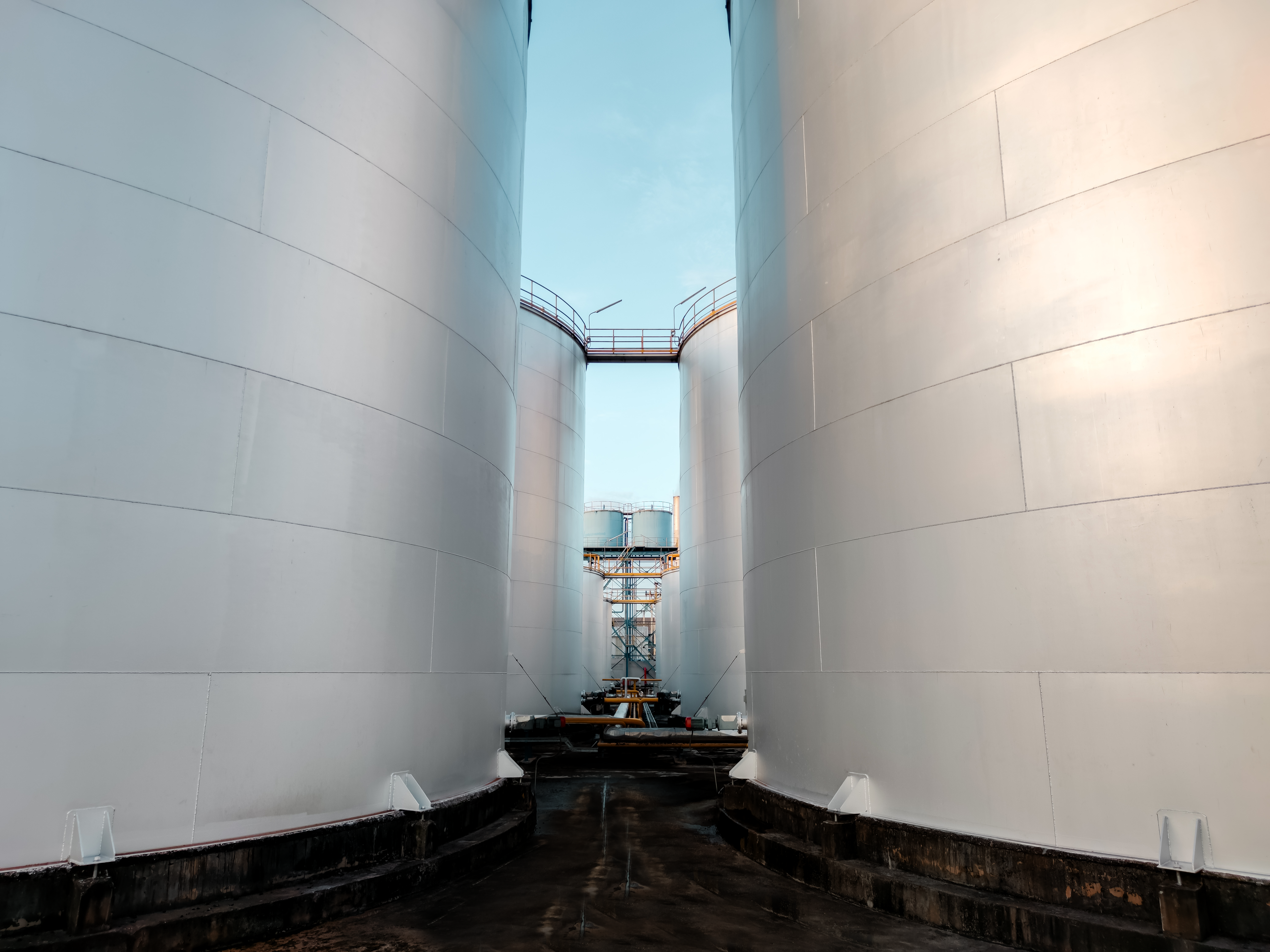Our path towards climate neutrality
Since 2010, FUCHS has been systematically pursuing its strategy for greater sustainability. And since 2011, the company has been reporting on the progress made in different areas in its annual sustainability report. This illustrates FUCHS’ commitment to assuming ecological, economic and social responsibility, documenting key figures and objectives and defining measures with which the company controls its sustainability activities. Since 2017, FUCHS has also published a non-financial statement that meets the requirements of the CSR Directive Implementation Act (CSR-RUG).
A genuine milestone in FUCHS' company history: Since 2020, FUCHS has been completely CO2-compensated at all of its more than 60 locations worldwide – from the energy consumption in production all the way up to the consumables used in administration operations. Yet we do not just focus on the ecological footprint in our own factories, but look beyond ourselves to the entire process and value chain of our products. This is why we participate in research projects on the use of sustainable raw materials. Together with our suppliers, we develop standards and measures for quantifying and certifying sustainability along the entire value chain. Above all though, our products reduce friction and increase energy efficiency for our customers – this has both a financial and ecological impact.
FUCHS' sustainability in figures
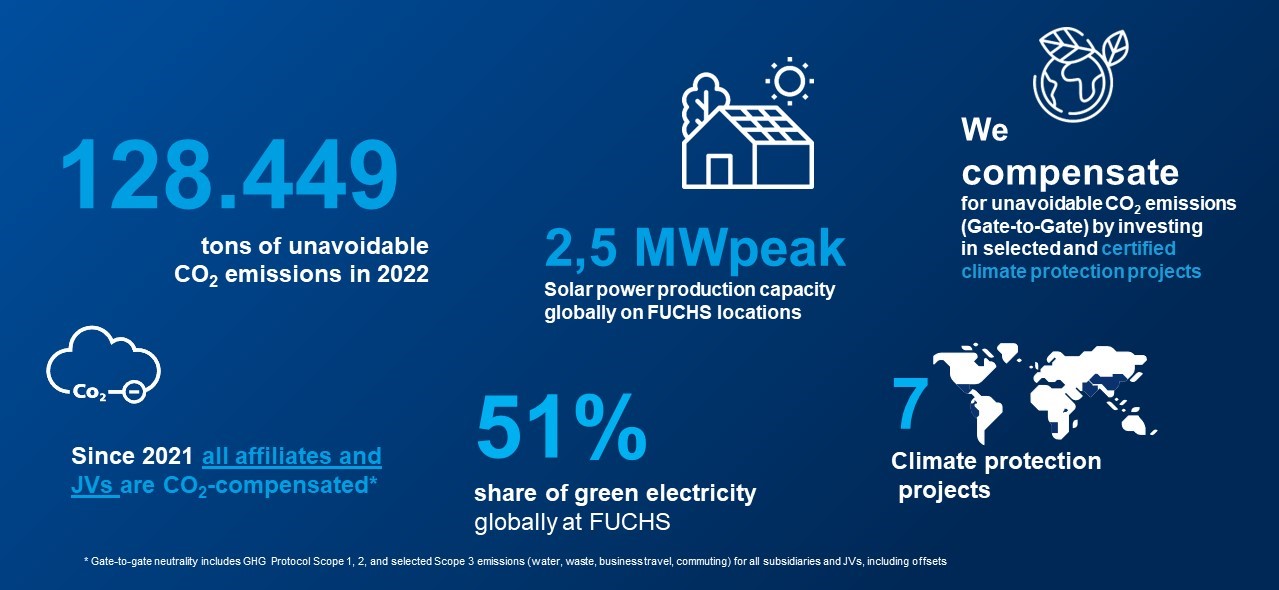
Milestones on FUCHS’ path to sustainability
The path to 2040
Active player for sustainability
The FUCHS carbon-neutrality strategy is embedded in our sustainability strategy, which began in 2010 when we signed the "Code of Responsible Conduct for Business". In 2018 we joined the "Alliance for Development and Climate" led by the Federal Ministry for Economic Cooperation and Development. At the same time, we initiated the foundation of a sustainability workgroup under the umbrella of the Union of the European Lubricants Industry (UEIL). Together, we develop harmonized sustainability standards, KPIs, and benchmarks to enable sustainability-based comparisons.
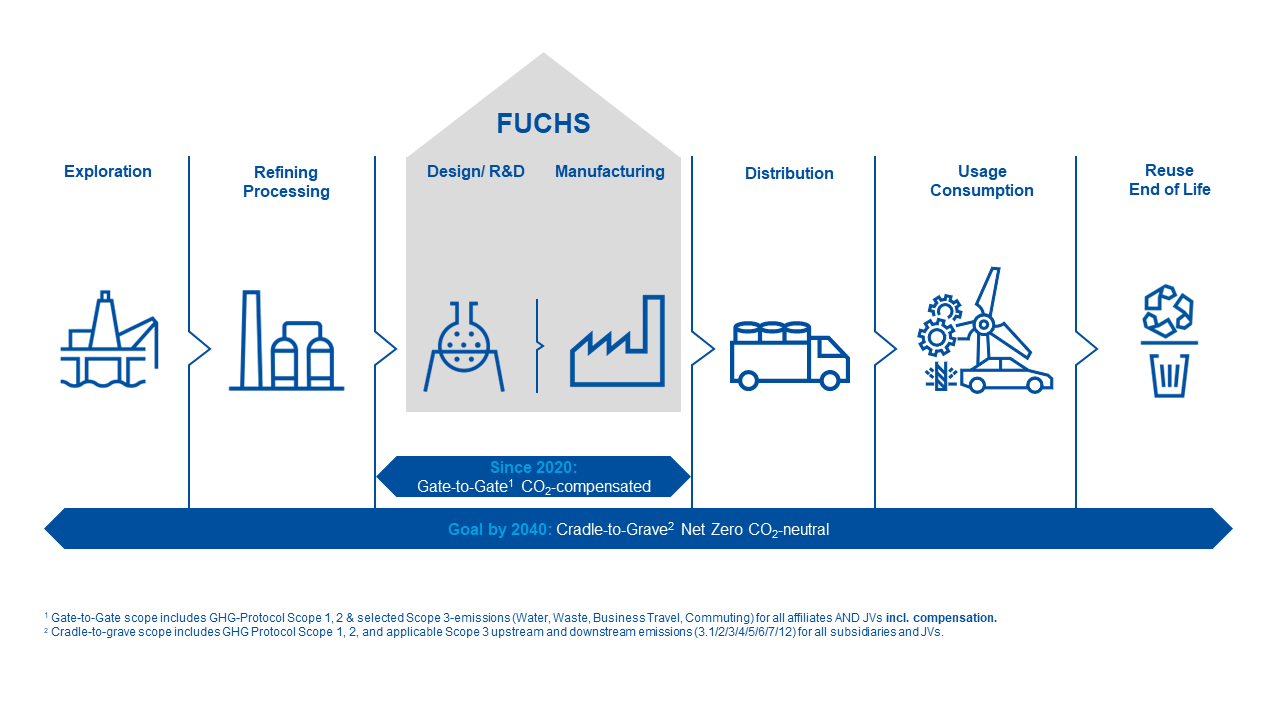
FUCHS already committed to two milestones in its neutrality strategy in 2019:
- CO2-compensated in the “gate-to-gate” scope from 2020 for all producing FUCHS companies
- CO2-compensated “cradle-to-gate“ by 2025
FUCHS has already achieved the first milestone, and in 2021 it also for the first time extended the recording of its Corporate Carbon Footprint and offset to all joint ventures. To do this, all greenhouse gas emissions of FUCHS that are directly attributable to our business activities (“gateto-gate”) have been measured retroactively since 2019 and offset through investments in climate protection projects. FUCHS restricts its choice of projects for this purpose to high-quality certifications such as UN Gold Standard or VERRA. In any case, compensation measures are only the last step undertaken once avoidance and reduction measures have met their limits. FUCHS is therefore continuously expanding the proportion of renewable energies that make up its power supply, with the aim of gradually sourcing its electricity worldwide from renewable sources.
Product Carbon Footprint
With the EU climate targets, more and more companies are focusing on their own emissions and a possible climate neutrality of business operations. The calculation of the product carbon footprint (PCF) is a major factor in this context as it summarizes all emissions along the value chain which are related to the product.
Raw materials
Buying sustainably
We know that conducting carbon-neutral operations within our own company alone is not enough. Our goal therefore is to sell carbon-neutral products long-term – and we get our suppliers on board to do this by purchasing raw materials. After all, these are responsible for 90 percent of the carbon footprint of a finished lubricant product. Within the scope of numerous research projects, we already support some of our suppliers in the search for corresponding options. And we've brought them all to the table: suppliers, competitors, and customers, in our European industry association UEIL. The objective here is to achieve measurable key performance indicators and criteria for sustainability.
Focus on biogenic raw materials
The use of biogenic raw materials from Europe as renewable, environmentally friendly alternatives to fossil raw materials is at the center of many of the research initiatives in which FUCHS is involved. Their main benefit is that they do not increase the carbon balance and their use often means a new source of income for domestic agriculture.
From deep-fat grease to a new raw material for high-performance specialty lubricants
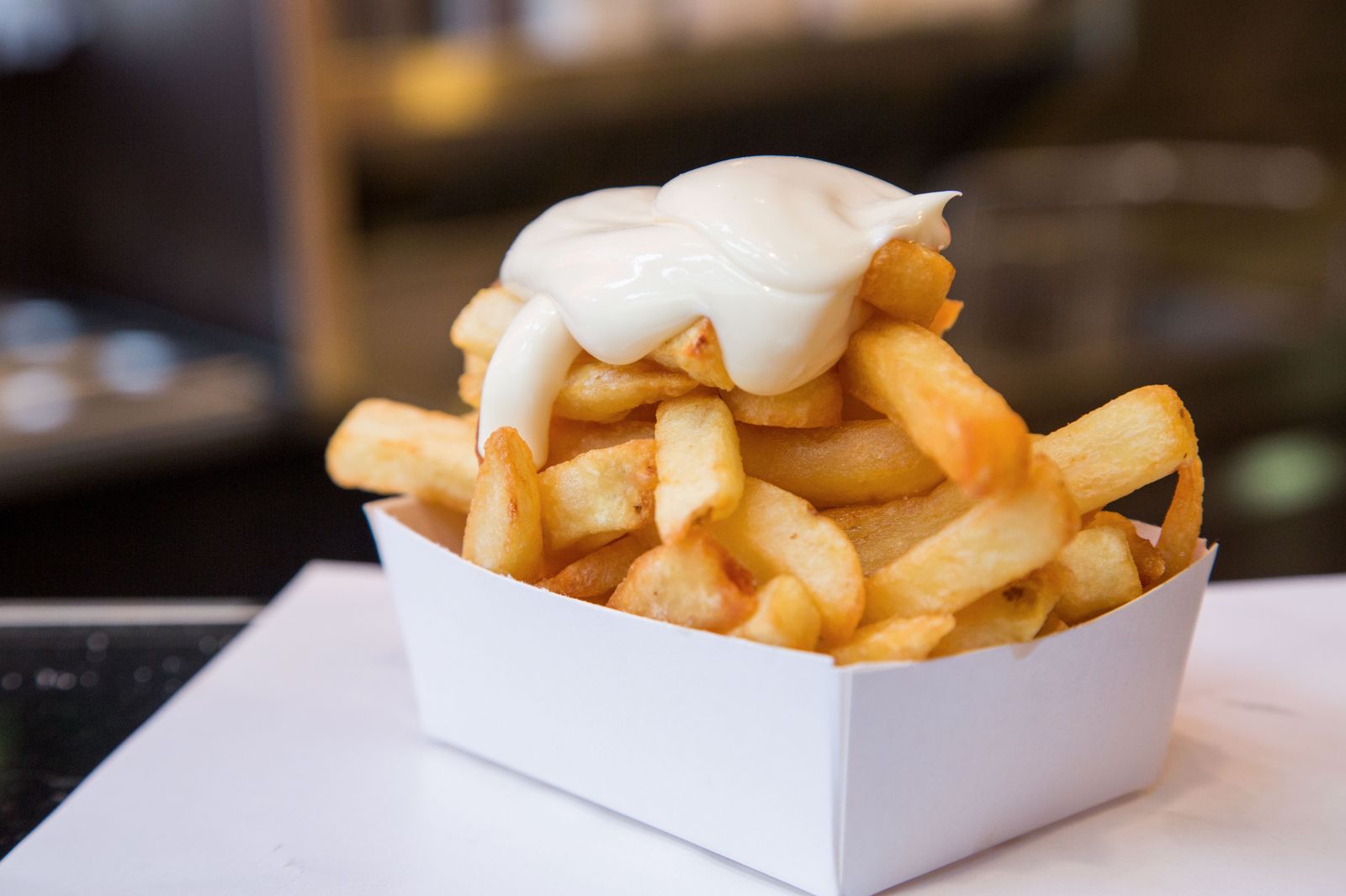
Huge amounts of waste grease are produced every day in industry and in everyday life. Especially in restaurants and snack bars, carbon-rich residual streams such as used frying fat are produced in large quantities, the potential of which has hardly been unlocked to date.
That is why FUCHS is actively taking part in research. And together with our research partners, we were able to refine frying fat to produce new, high-quality raw materials for lubricants.
Producing and using energy responsibly
Naturally, the first thing we look at in terms of sustainability at all of our sites worldwide is our own production, as this is where we can make direct changes. In this way, we have succeeded in lowering CO2 emissions per produced ton of lubricant by 30 percent since 2010. And through continuously optimizing procedures and processes, we will further reduce energy and water consumption and further increase the share of green electricity which reached 51% in 2022. In this way, we will be able to gradually roll back carbon-compensation measures through the support of climate protection projects in the medium term.
Best practices from the FUCHS world
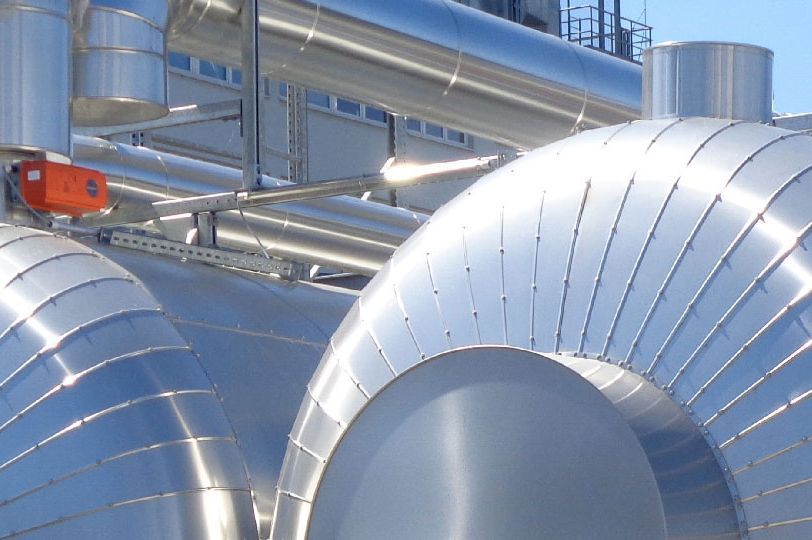
Germany: Production site heats test bay
A perfect example of ecological responsibility at the Mannheim site: High-temperature condensate from the neighboring production site is used for the newly built test field building and to keep an adjacent warehouse frost free. The high-temperature condensate supplies both the ventilation systems as well as the heaters and ceilings of the test bay building via heat exchangers. The environmentally friendly result: 18 tons of carbon dioxide are saved each year.
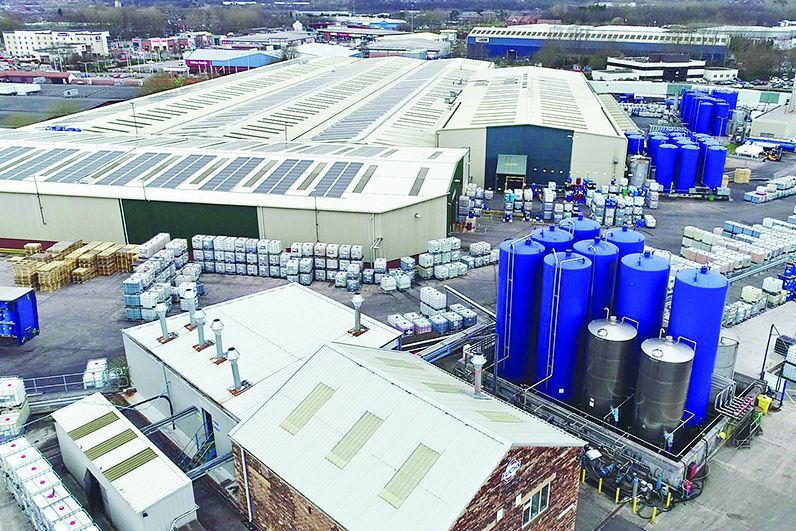
Great Britain: 2,000 solar collectors
The British FUCHS subsidiary is setting a good example. Around 2,000 solar collectors on the roof of the new office at the company headquarters in Hanley, Stoke-on-Trent, produce around 14 percent of the energy required for the entire site. 95 percent of the lighting is supplied by LED lights – and in the new, fully automated warehouse with 4,000 pallet spaces a rainwater system collecting 1.8 million liters of water per year has been installed in 2020.
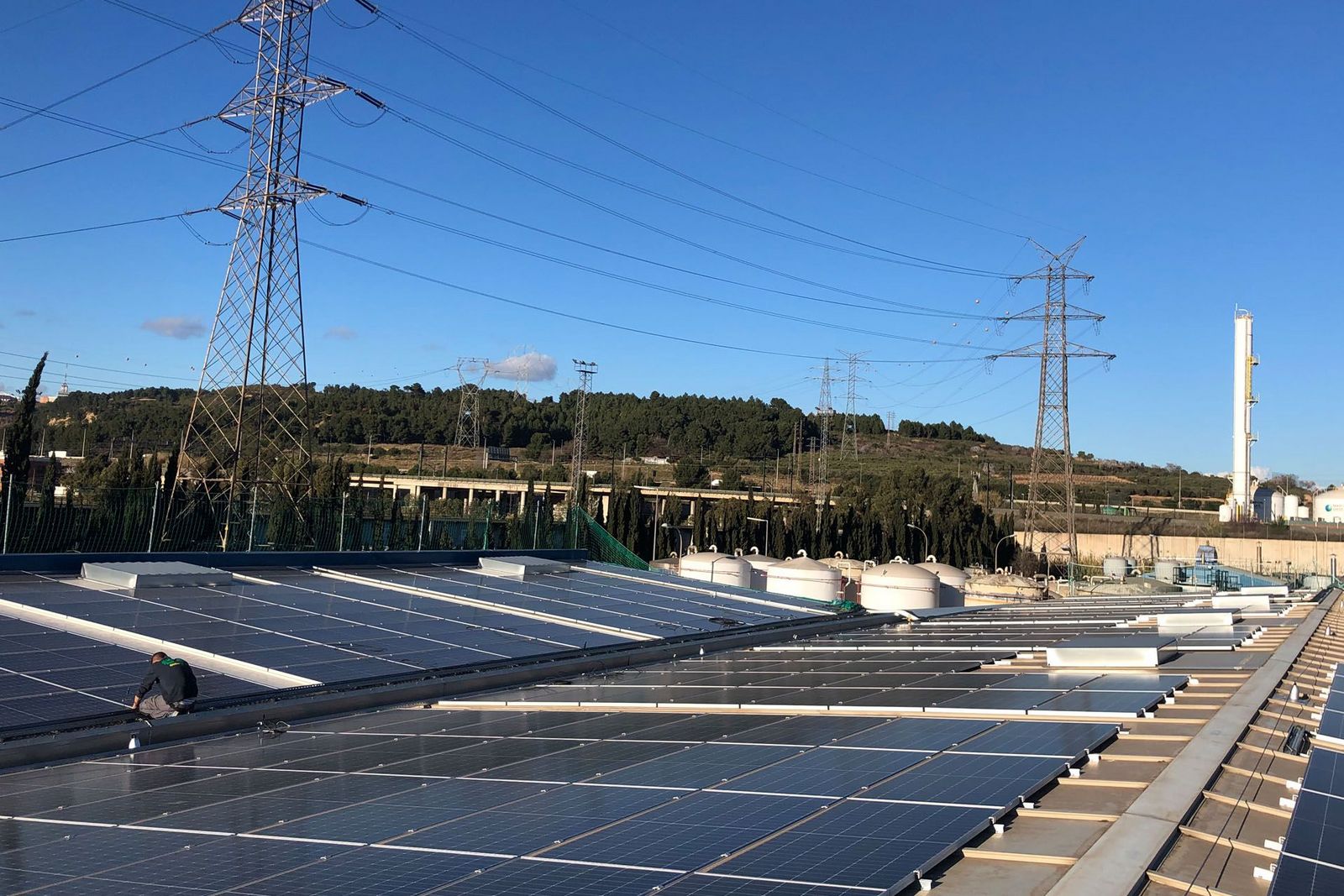
Spain: 335 kilowatt peak solar panels
Another excellent project that brings us closer to our goal of being more sustainable is at the subsidiary in Spain. FUCHS operates numerous plants and warehouses around the globe with a lot of roof space. While others invest in setting up their own wind parks, FUCHS can use the surfaces it has for building solar systems. That's exactly what is currently happening at the Spanish site in Castellbisbal. An installation covering 1,650 square meters with an installed power of 335 kilowatt peak is being built on the roofs of several warehouses.
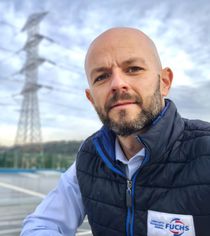
"
We will be able to cover around 43% of our annual power consumption with the new solar panels system.
Eladio Cuadrado Managing Director of FUCHS Lubricantes S.A.U.
"
FAQs on climate neutrality and compensation.
Climate change is one of the greatest challenges of our time and it affects the whole human race, even though we in Central Europe are lucky enough to feel the effects only to a comparatively small extent. In other regions of the world, the consequences of global warming such as rising sea levels and the drying-up of lakes and rivers are existential threats for the people living there. The rich industrialized nations emit a comparatively large amount of CO2, especially through intensive industrial production. So for FUCHS, our commitment to global climate protection means assuming global responsibility with regard to economic, ecological and social aspects. In October 2019, therefore, FUCHS joined the “Alliance for Development and Climate” of the German Federal Ministry for Economic Cooperation and Development (BMZ) as an official supporter. The members of this alliance, which combines climate protection and sustainable development, strive for CO2-neutrality by avoiding, reducing and offsetting CO2 emissions at the same time.
Climate-damaging CO2 emissions result from numerous processes directly or indirectly related to the combustion of fossil fuels. Since CO2 emissions impact on the climate at a global level, it is ultimately irrelevant where on the planet they originate and where they are saved. So the offsetting of emissions proportionate to the amount produced – for example, through investments in international climate protection projects – ultimately ensures that the carbon footprint remains neutral. With carbon offsetting, therefore, the added value for the environment is generated through the voluntary promotion of climate protection projects, which would not be possible without such additional income. This voluntary financial support not only helps the selected countries to improve their economic, social and ecological circumstances, but is also a major driver for the transfer of clean technologies and sustainable global economic development.
Although the direct CO2 footprint in the manufacture of lubricants is comparatively low – a factor that sets FUCHS apart from the rest of the chemical industry – it was and remains our aim to reduce it continuously and systematically. For example, energy-consumption-specific CO2 emissions per ton of FUCHS lubricant produced have already been reduced by a total of around 30% since 2010. Global CO2-neutrality is another milestone in our FUCHS sustainability strategy, which we launched ten years ago. Sustainability is one of FUCHS’ core corporate values. The success of global emission reductions depends to a great extent on the voluntary and systematic actions of the business sector in industrialized countries. This is why we decided to take our share of responsibility and offset our CO2 footprint. In this way, we are taking responsibility for global climate protection and making an important contribution to achieving the goals of the UN climate protection agreement ratified in Paris in 2015. This agreement aims to limit global warming to well below two degrees Celsius compared with pre-industrial levels. We want to actively protect our environment and help our customers to do their bit, too. From January 1, 2020, our customers across the world will receive lubricants from FUCHS as a CO2-compensated lubricant company, produced in CO2-compensated processes.
From 2020, FUCHS has been completely CO2-compensated globally.This means that it will no longer leave a CO2 footprint and thus no longer have a negative impact on CO2 concentrations in the atmosphere. As an industrial company, FUCHS will continue to emit CO2. This is unavoidable in many places. But from 2020, we will neutralize all our CO₂ emissions from our 56 FUCHS locations worldwide – from energy consumption in production to consumables in administration. To achieve CO2-compensation, FUCHS has offset its unavoidable CO2 emissions with compensation measures. This is done by investing in high-quality climate protection projects aimed primarily at promoting renewable energies.
The step towards global FUCHS CO2-compensation from January 1, 2020 was prepared for one year and accompanied by the sustainability consultancy Fokus Zukunft. Fokus Zukunft reviewed the calculation of FUCHS’ CO2 emissions in September 2019 and confirmed the accuracy of the data basis and the application of the Greenhouse Gas Protocol guidelines as the calculation standard for determining CO2 emissions. Fokus Zukunft then certified the FUCHS Group as a CO2-compensated company, which means that FUCHS will be entitled to declare itself CO2-compensated from January 1, 2020.
Neutrality refers to the global CO2 footprint generated by FUCHS at all its worldwide locations through heat, fuel and electricity consumption in production, administration and research processes, through upstream energy-related emissions, business trips, hotel overnight stays and employee commutes as well as through waste generation and waste water in the company. This enables us to precisely calculate the CO2 emissions generated. Based on this calculation, FUCHS then makes compensatory investments in climate protection projects to offset the corresponding amount of CO2.
Our projects are accredited, approved and monitored according to internationally recognized certification standards such as the Gold Standard as well as by renowned organizations such as the United Nations (UN). The projects certified according to the Gold Standard fulfill especially stringent requirements. They not only save CO2, but also contribute to local sustainable development. The validation of the project results with regard to the CO2 savings achieved is verified by independent testing bodies such as TÜV.
When selecting projects, we focus on high-quality voluntary climate protection projects that support economic, ecological and social development worldwide in countries and regions of the “Global South” with FUCHS locations and where these projects are aimed primarily at promoting renewable energies. According to the current list of the German Federal Ministry for Economic Cooperation and Development (BMZ), the “Global South” refers to socially, politically and/or economically disadvantaged countries. In this way, FUCHS fulfills its global social responsibility in the sense of corporate citizenship. At the same time, we are also supporting most of the 17 sustainable development goals of the UN, to which we have officially committed ourselves since 2018. When selecting projects, we also ensure that we support at least one high-quality project every year within each of the six project sectors (biomass, ovens, solar energy, forest conservation, hydropower, wind energy).
CO2 offsetting means that greenhouse gases that are produced in one region of the earth and cannot be avoided are compensated by climate protection projects in another region. To finance these, companies buy certificates for a range of different projects. Each certificate represents 1 ton of CO2 saved by the project. Numerous climate protection projects – most of them in the field of renewable energy – have been launched worldwide. In return for their participation, the project initiators receive emission credits, which can be traded in the form of climate protection certificates. The amount is calculated, for example, on the basis of a comparison with the emissions that would have resulted from the construction of a coal-fired power plant.
Yes, because they are tested and certified by independent institutions – a minimum requirement for FUCHS. These institutions – including various TÜV companies – issue the certificates according to internationally applicable standards. A key aspect of emissions trading is the retirement of certificates after they have been acquired. Retirement must be clearly documented. Each CO2 offset ends with the documented retirement of the certificates. This ensures that the same certificates are not traded more than once, which, in turn, would invalidate the principle of balance. FUCHS acquired its climate protection project certificates via Fokus Zukunft and the organisation First Climate.
Voluntary CO2 offsetting works according to the principle that greenhouse gas emitters invest in and support voluntary climate protection projects by purchasing emission reduction certificates. Prices depend on the individual project; in other words, when an emission reduction certificate is purchased, a third party is commissioned to save one ton of CO2 in the atmosphere in another region of the earth on the company’s behalf. Pricing on the CO2 market is also determined by supply and demand. Projects that, above and beyond simple climate protection, offer additional benefits for the people and the environment in the region where the project is being undertaken frequently achieve higher prices on the market.
With CO2 offsetting, the added value for the environment is generated through the voluntary promotion of climate protection projects, which would not be possible without the additional income. Only climate protection projects that can prove their added value within the framework of certification are recognized and so gain access to the market. Trading in CO2 reduction certificates follows a principle known as “results-based finance.” This refers to the idea that the developers of climate protection projects can issue emission reduction certificates only if their project has already been implemented and demonstrably helps to reduce CO2 emissions. So anyone who acquires CO2 reduction certificates in order to compensate for their own emissions can be confident that purchasing certificates will be matched by a real benefit for climate protection. This mechanism, which is embedded in the Kyoto Protocol, has become firmly established over the past 20 years and proven itself as a central component of voluntary, non-governmental climate protection. The process is supported by the UN, numerous non-governmental organizations and hundreds of large companies, including those in the petroleum industry. FUCHS invests exclusively in projects that meet the above criteria and was able to choose its project partner and climate project with the support of Fokus Zukunft respectively First Climate. But it is also clear that this form of CO2 offsetting will merely support and not replace our ongoing efforts to globally reduce our (avoidable) CO2 emissions.
FUCHS continues to follow the principle of avoid–reduce–offset. Around 80% of FUCHS’ CO2 emissions are caused by heat and electricity consumption, so energy efficiency is an important lever in avoiding or reducing CO2. In the medium term, FUCHS intends to gradually reduce its CO2 compensation payments and increase its share of renewable energy supplies while continuing to invest in improving the energy efficiency of its locations.
In the long term, the company aims to sell CO2-compensated products to its customers. However, this also requires that FUCHS will in the future receive CO2-comepnsated raw materials from its suppliers – after all, these account for around 90% of the carbon footprint of FUCHS lubricants. As the world’s largest independent manufacturer, however, we occupy a central position in the lubricant market and so are well-positioned to exert our influence in the upstream value chain. We expect our suppliers in the future to use more sustainable, innovative preliminary products so that they can supply us with either lower-carbon or CO2-compensated raw materials for lubricant production. Only in this way can FUCHS, as a CO2-compensated lubricant company, offer its customers CO2-compensated lubricants from CO2-compensated production.
Absolutely. Through a number of internal and external measures, FUCHS not only promotes its own CO2-compensation and, in turn, climate protection as a whole, but it has also been developing, producing and marketing numerous emission-reducing and eco-friendly lubricants for almost 90 years. So during the application phase, these products make a greater contribution to saving energy and CO2 emissions than conventional alternatives thanks to reduced friction and their ability to protect against wear and corrosion. FUCHS has begun to quantify these higher CO2 savings effects by performing lifecycle analyses and assessments so that, in the future, it can categorize its lubricant portfolio by the CO2 footprint of individual product groups. We believe that the CO2 categorization of the product portfolio will become a key component in the production specifications published by lubricant manufacturers and, in addition to performance and price, a key differentiating feature and, in turn, a competitive advantage for FUCHS. One objective of our business activities is to develop solutions aimed at reducing the CO2 footprint of not only our raw materials and lubricant production processes, but also of our customers.
